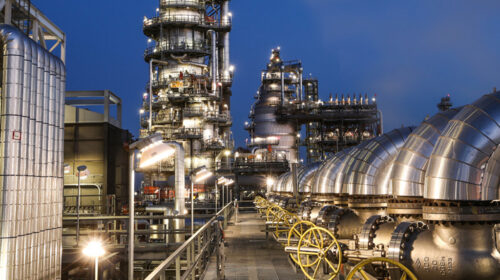After a month-long impasse, the government on Monday conditionally agreed to provide 50 per cent gas supply to textile manufacturers for co-generation on a best effort basis provided they surrender in writing their stay orders and get their energy audits conducted.
Energy Minister Hammad Azhar told Dawn that a government team and a delegation of All Pakistan Textile Mills Association (Aptma) on Monday reached an agreement under which textile mills would be provided half of their requirement — 75 million cubic feet per day (mmcfd) instead 150 mmcfd — on best effort basis. This will be supplied only to co-generation plants.
In return, the textile millers would give in writing that they would not go for stay orders to get gas reconnection. Also, the millers would submit their energy efficiency audits and those not able to do so by June 30 would be permanently removed from gas supply. The energy efficiency audit is now mandatory for all textile mills and has to be completed by June 30, 2022.
Millers must give written assurance they would not seek stay orders for reconnection
Mr Azhar said the textile mills had been clearly told that their gas supply priority would, in any case, be deemed lower than ‘process gas’ (textile processes that are impossible without natural gas). The millers had separately secured stay orders against energy audits and disconnection of gas supplies.
Amid major gas supply constraints, as the gas companies particularly Sui Northern Gas Pipelines Limited (SNGPL) started gas disconnections to captive power plants (CPPs) of textile mills on Ministry of Energy’s instruction, some of the millers approached courts and secured stay orders, creating serious supply challenges.
The energy ministry felt aggrieved by the textile industry’s attempts to protect gas supplies and subsidies through courts instead of honouring its commitments to spare gas quantities being used in CPPs while gas companies struggled to manage supplies for other priority sectors.
The energy ministry had received an independent study from three internationally reputed organisations — The University of Chicago, The London School of Economics and Political Science and International Growth Centre — which did not comprehensively support a narrative in the country that gas and electricity subsidies had a direct link to export growth.
The ministries of energy, finance and planning are convinced about rent-seeking and misuse in the textile sector, he said.
The government has been providing subsidised gas and power at $6.5 per mmBtu and nine cents per kwh, respectively, for three years, but now finds it unsustainable and untargeted. It estimates the cost of annual gas subsidy at Rs65bn and Rs20bn on power subsidy, leading to circular debt build up. This is on top of other subsidies and facilitations like DTRE, TERF and DLTL schemes as well as tax exemptions. The gas rates for exports were recently increased to $9 per unit instead of $6.5 as LNG import rates surged manifold.
About 1,870 export industries, located most in Punjab, were currently getting uninterrupted gas on SNGPL network while about 420 factories most in Sindh were on Sui Southern Gas Company Ltd network. Due to the gas crunch, about 375 factories with CPPs had been disconnected as they were running their power plants — mostly inefficient — at subsidised gas while gas for their processes was still intact.
Officials said the subsidy was originally meant for one year to revive the export sector but was later extended for another year till June 2020 due to the challenges arising out of the Covid-19 pandemic. The textile mills had agreed to an end to the gas subsidy on June 30, 2020.
The energy ministry is now pushing for targeted subsidies to exporters based on export proceeds. Specifically, for textile exports, it wants gas supply only for cloth-making and complete ban on gas consumption by CPPs as both the process and CPPs have separate meters.





